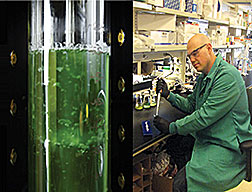- Number 445 |
- August 10, 2015
Scientists hijack light-loving bacteria to make high-value products

In Pacific Northwest National Laboratory’s
Microbial Cell Dynamics Laboratory,
scientists produce microorganisms for
biofuels and alternative fuel research.
Scientists at Pacific Northwest National Laboratory and Colorado School of Mines have directed a common bacterium to produce more of a valuable fatty acid, lauric acid, than it typically does. The achievement is noteworthy not simply because of the increased production of fatty acid, which can be a useful component of biofuels. The work opens the door for scientists to manipulate such organisms to produce compounds useful as fuels or medicines.
"We now know enough about redirecting traffic inside the cell that we can engineer cells to make more of the products that have high value. This is useful not only for making commercially viable biofuels but also commodities such as pharmaceuticals," said microbiologist Alex Beliaev, Pacific Northwest National Laboratory, who led the study, which was published in Frontiers in Bioengineering and Biotechnology.
The team of researchers worked together with a single-celled organism called Synechococcus sp. PCC 7002, a type of cyanobacteria—organisms that make building blocks for new cells out of air, water, and sunlight. Like its cousins, common forms of algae, cyanobacteria suck in huge amounts of carbon dioxide from the environment and convert it into other materials, such as biomass. Thus, they play a critical role in Earth's climate. Scientists the world over currently are developing ways to take advantage of these natural processes to create new forms of energy.
Full Story: https://www.pnnl.gov/science/highlights/highlight.asp?id=4060.[Ken Hodge, 509.372.6121,
Kenneth.Hodge@pnnl.gov]
